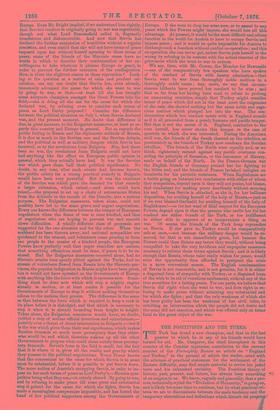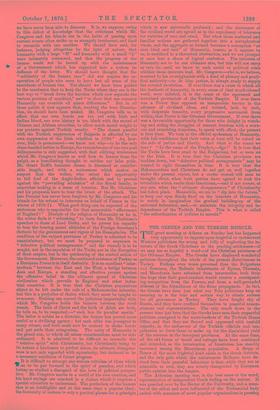THE POSITIVISTS AND THE TURKS.
we have never been able to discover. It is, we suppose, owing to this defect of knowledge that the criticisms which Mr. Congreve and his friends are in the habit of passing upon current events often strike us as strangely incoherent, and hard to reconcile with one another. We should have said, for instance, judging altogether by the light of nature, that humanity with a large "H" and humanity with a small "h" were intimately connected, and that the progress of the former could not be bound up with the maintenance of a Government which has organised into a system its defiance of the latter. We should have thought that the "solidarity of the human race" did not require the co- operation of people who seem to have lost all sense of the sacredness of human ties. Nor should we have been guided to the conclusion that to keep the Turks where they are is the best way to "break down the barriers which now separate the various portions of mankind," and "to show that one common Humanity can override all minor differences." But in all these points it now appears that, wanting the true illumina- tion, we should have been misled. Mr. Congreve tells us in effect that our own hands are too red with Irish and Indian blood, our own history is too black with the record of Chinese and African atrocities, to allow much moral weight to our protests against Turkish cruelty. "The closest parallel with the Turkish suppression of Bulgaria is afforded by our own suppression of the Irish rebellion in 1798." As, how- ever, Italy is pronounced—we know not why—to be the only clean-handed nation in Europe, the remembrance of our own past delinquencies is only suggested, with that edifying irrelevance which Mr. Congreve knows so well how to borrow from the pulpit, as a humiliating thought to subdue our false pride. Mr. Grant Duff's fantastic dream is discussed at consider- able length, and with a seriousness which makes us suspect that the writer, who seizes the opportunity to fall foul of the Anglo-Indian officials and to protest against the "prevailing adulation" of the Royal family, is somewhat lacking in a sense of humour. But Mr. Gladstone and his proposals have to bear the brunt of the attack. The late Premier has never been forgiven by Mr. Congreve and his friends for his refusal to intervene on behalf of France in the winter of 1870-71. What good thing can be expected of the statesman who is responsible for that memorable "effacement of England ? " Disciple of the religion of Humanity as he is, the writer finds it " refreshing " to turn from Mr. Gladstone's speeches to those of Lord Derby, and he proves his capacity to bear the bracing moral altitudes of the Foreign Secretary's rhetoric by the genuineness and vigour of his Russophobia. The condition of the subject provinces of Turkey is admitted to be unsatisfactory, but we must be prepared to acquiesce in "defective political arrangements ;" and the remedy is to be sought, not in the expulsion of the Turks, nor in the disruption of their empire, but in -the quickening of the central action of the Government. Moreover, the continued existence of Turkey as a European Power is in itself desirable. It is an excellent " inter- medium " between the East and the West, a bridge between Asia and Europe, a standing and effective protest against the offensive belief in the ultimate spread of Christian civilisation which prevails in England and other indus- trial countries. It is true that the Christian populations object to be left under the rule of a Mahommedan minority, but this is a prejudice of theirs, which they must be taught to overcome. Nothing can exceed the judicious impartiality with which Mr. Congreve holds the balance between the rival creeds. The faith of Christ and the faith of Allah are both, he fella us, to be respected,—" each has its peculiar merits." The latter is nobler as a doctrine, the former has proved more useful as a civilising agency ; but each alike has prompted to many crimes, and both must now be content to shake hands and put aside their antagonism. The unity of Humanity is the grand aim, to which all minor considerations must be sub- ordinated. It is admitted to be difficult to reconcile this "relative spirit" with Christianity, but Christianity being by its nature a hindrance to perfect union, its ultimate disappear- ance is not only regarded with equanimity, but declared to be a necessary condition of future progress. ...It is difficult to attempt any serious criticism of ideas which 11r,m to be pat forward in the spirit of paradox, and which betray so studied a disregard of the laws of political perspec- tive. Mr. Congreve moves in a world of his own creation, and his hard sayings are couched in a dialect which it requires a special education to understand. The perfection of the human race is an intelligible and at the same time a popular ideal ; the fraternity of nations is only a poetical phrase for a principle which is now universally professed ; and the statesmen of the civilised world are agreed as to the expediency of tolerance for varieties of race and creed. But when these scattered and familiar notions are gathered together into a metaphysical whole, and the aggregate so formed becomes a conception "at once ideal and real" of Humanity, reason, as it appears to us, is sacrificed to a rhetorical abstraction, and we are plunged at once into a chaos of logical confusion. The interests of Humanity are to be our ultimate aim, but this will not carry us very far, until we know in each social or political crisis whither those interests lead. Mr. Congreve—who is, we believe, invested by his co-religionists with a kind of plenary and ponti- fical authority—to do him justice, is always ready to supply the coveted revelation. If ever there was a cause in which all the instincts of humanity, in every sense of that much-abused word, were enlisted, it is the cause of the oppressed and terrorised provincials of the Turkish Empire. If ever there was a Power that opposed an insuperable barrier to the advance of civilised ideas, and resisted, inch by inch, with desperate tenacity, every progressive movement from within, that Power is the Ottoman Government. If ever there was a favourable opportunity for those who delight in watch- ing and aiding the struggles of nascent freedom with a worn- out and crumbling despotism, to speak with effect, the present is that time. We turn to the official spokesmen of Humanity, with full confidence that their voice at least will be raised on the side of justice and liberty. And what is the sound we hear? "In the name of the Prophet,—figs I" It is true that the Turks have been cruel to the Bulgarians, but so were we to the Irish. It is true that the Christian provinces are trodden down, but "defective political arrangements" may be trusted to right themselves in time. It is true that the Mahommedans and Christians do not get on well together under the present regime, but a modus vivendi will soon be brought about, when both parties have agreed to sink the trivialities which excite their fanaticism,—and if not sooner, at any rate when the "ultimate disappearance" of Christianity- has taken place. Meanwhile, we are to "dip into the future," to keep our eyes firmly fixed on the interests of Humanity, to watch in imagination the gradual building-up of the universal federation, and,—to maintain the, integrity and in- dependence of the Turkish Empire. This is what is called "the subordination of polities to morals."



































 Previous page
Previous page